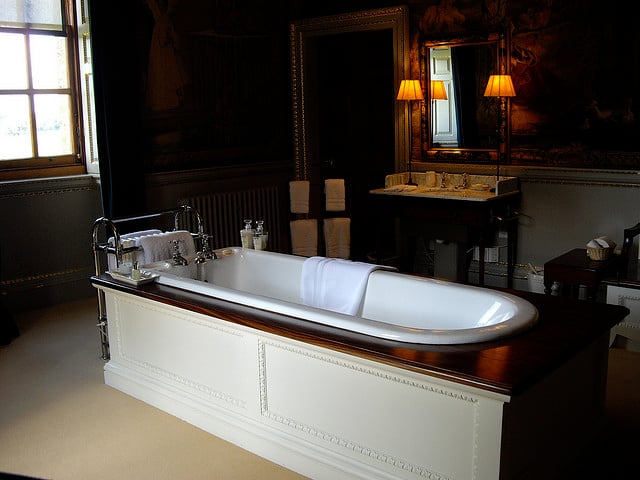Below is a great post by Mike Wheatley of RealtyBiz. Emerging trends include specialized storage, charging stations, porcelain floors, quartzite counters and more – an interesting rundown on design trends we will see in 2015.
Ten Hot Trends For 2015
This time of the year, we hear from just about every sector of the economy what’s expected to be popular in the coming year. Foodies with their fingers on the pulse of the restaurant industry and hot TV chefs will tell us to say goodbye to beet-and-goat cheese salad and hello roasted cauliflower, and there’s no end to the gadgets touted as the next big thing.
In real estate, however, trends typically come slowly, often well after they appear in commercial spaces and fashion. And though they may entice buyers and sellers, remind them that trends are just that—a change in direction that may captivate, go mainstream, then disappear (though some will gain momentum and remain as classics). Which way they’ll go is hard to predict, but here are a few trends that experts expect to draw great appeal this year
Coral shades
A blast of a new color is often the easiest change for sellers to make, offering the biggest bang for their buck. Sherwin-Williams says Coral Reef (#6606) is 2015’s color of the year because it reflects the country’s optimism about the future. “We have a brighter outlook now that we’re out of the recession. But this isn’t a bravado color; it’s more youthful, yet still sophisticated,” says Jackie Jordan, the company’s director of color marketing. She suggests using it outside or on an accent wall. Pair it with crisp white, gray, or similar saturations of lilac, green, and violet.
Open spaces go mainstream
An open floor plan may feel like old hat, but it’s becoming a wish beyond the young hipster demographic, so you’ll increasingly see this layout in traditional condo buildings and single-family suburban homes in 2015. The reason? After the kitchen became the home’s hub, the next step was to remove all walls for greater togetherness. Design experts at Nurzia Construction Corp. recommend going a step further and adding windows to better meld indoors and outdoors.
Off-the-shelf plans
Buyers who don’t want to spend time or money for a custom house have another option. House plan companies offer myriad blueprints to modify for site, code, budget, and climate conditions, says James Roche, whose Houseplans.com firm has 40,000 choices. There are lots of companies to consider, but the best bets are ones that are updating layouts for today’s wish lists—open-plan living, multiple master suites, greater energy efficiency, and smaller footprints for downsizers (in fact, Roche says, their plans’ average now is 2,300 square feet, versus 3,500 a few years ago). Many builders will accept these outsiders’ plans, though they may charge to adapt them
Freestanding tubs
Freestanding tubs may conjure images of Victorian-era opulence, but the newest iteration from companies like Kohler shows a cool sculptural hand. One caveat: Some may find it hard to climb in and out. These tubs complement other bathroom trends: open wall niches and single wash basins, since two people rarely use the room simultaneously.
photo credit: Rev Stan via photopin cc
Quartzite
While granite still appeals, quartzite is becoming the new hot contender, thanks to its reputation as a natural stone that’s virtually indestructible. It also more closely resembles the most luxe classic—marble—without the drawbacks of staining easily. Quartzite is moving ahead of last year’s favorite, quartz, which is also tough but is manmade.
Porcelain floors
If you’re going to go with imitation wood, porcelain will be your 2015 go-to. It’s less expensive and wears as well as or better than the real thing, says architect Stephen Alton. Porcelain can be found in traditional small tiles or long, linear planks. It’s also available in numerous colors and textures, including popular one-color combos with slight variations for a hint of differentiation. Good places to use this material are high-traffic rooms, hallways, and areas exposed to moisture.
Almost Jetson-ready
Prices have come down for technologies such as web-controlled security cameras and motion sensors for pets. Newer models are also easier to install and operate since many are powered by batteries, rather than requiring an electrician to rewire an entire house, says Bob Cooper at Zonoff, which offers a software platform that allows multiple smart devices to communicate with each other. “You no longer have to worry about different standards,” Cooper says.
Charging stations
With the size of electronic devices shrinking and the proliferation of Wi-Fi, demand for large desks and separate home office is waning. However, home owners still need a dedicated space for charging devices, and the most popular locations are a corner of a kitchen, entrance from the garage, and the mud room. In some two-story Lexington Homes plans, a niche is set aside on a landing everyone passes by daily.
photo credit: the tartanpodcast via photopin cc
Wellness systems
Builders are now addressing environmental and health concerns with holistic solutions, such as heat recovery ventilation systems that filter air continuously and use little energy, says real estate developer Gregory Malin of Troon Pacific. Other new ways to improve healthfulness include lighting systems that utilize sunshine, swimming pools that eschew chlorine and salt by featuring a second adjacent pool with plants and gravel that cleanse water, and edible gardens starring ingredients such as curly blue kale.
Special storage
The new buzzword is “specialized storage,” placed right where it’s needed. “Home owners want everything to have its place,” says designer Jennifer Adams. More home owners are increasingly willing to pare the dimensions of a second or third bedroom in order to gain a suitably sized walk-in closet in their master bedroom, Alton says. In a kitchen, it may mean a “super pantry”—a butler’s pantry on steroids with prep space, open storage, secondary appliances, and even a room for wrapping gifts. “It minimizes clutter in the main kitchen,” says architect Fred Wilson of Morgante-Wilson.

